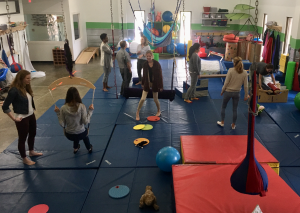The Division of Speech and Hearing Sciences has launched a professional development series as part of its curriculum in order to foster a better understanding of interprofessional, skills-based work. This series enhances the student experience by showcasing a variety of advanced clinical topics to speech-language pathology students, conducted by master clinicians who have at least five years of clinical experience and have supervised at least two students.

As an affiliate clinical instructor for the professional development series, Anna Housman (’13 MS) said she remembers the experience of being a graduate student, and that getting a tailored hands-on experience, similar to the professional development program, was more difficult to come by.
“Students tend to do really well when they’re seeing the breadth of combined services,” Housman said. “I love teaching; I love working with graduate students.”
Housman holds a master’s degree and is a certified speech-language pathologist. She works at Emerge Pediatric Therapy, where students visited to learn more about interprofessional collaboration and showcasing a sensory approach to speech-language therapy.
“We consider ourselves a teaching clinic, in the same way that UNC is a teaching hospital,” Housman said. “I had really stellar advisors as a graduate student, and I wanted to pass that on.”
Housman said the course began with an introduction to sensory considerations—beyond the five senses.
“They’re learning what all those systems are and your ability to maintain a calm body,” Housman said. “How can we take that knowledge and bring it to a child who is overstimulated, or under stimulated?”
Second-year student Sarah Cloud said Housman provided students with a more nuanced understanding of behavior.
“[She] provided great resources to refer to in the future when we have a child that shows signs of being a seeker, avoider, sensitive, or bystander.”
Judy Schmidt ‘86, a clinical assistant professor in the Division of Clinical Rehabilitation and Mental Health Counseling, oversees interprofessional education in the Department of Allied Health Sciences, in which both divisions are housed. Schmidt said the department is dedicated to providing quality interprofessional learning opportunities to our students in the health professions and related fields that will increase their knowledge and skills for interdisciplinary work.
“This type of education is achieved when two or more students from different professions come together in a learning environment that promotes deliberate activities that help them learn from, with, and about each other,” Schmidt said. She said the department is committed to developing substantive learning experiences for students that provide them with the knowledge and skills to provide quality, ethical care, to understand the roles and responsibilities of other providers, and increase their communication and teamwork skills for future practice in interdisciplinary settings.
“The professional development series offered by our Division of Speech and Hearing Sciences is an exciting opportunity for students to learn how to effectively work with children who require a strong collaborative approach to meet their healthcare needs,” Schmidt said. “This will establish a precedent for interprofessional learning for our department.”
Heather Cook, also a second-year student, said she learned how a child’s sensory needs could be met during a speech therapy session, such as by use of a swing during therapy, the effect of dimmed lighting, and the use of weighted blankets. She also learned that speech-language pathologists can work with other therapists by using play-based activities while meeting the needs of a child’s sensory system.
“I loved seeing therapists in action,” Cook said. “It was an interprofessional experience I’ll take with me after I graduate.”
Housman has served as a clinical preceptor for many years and said she was honored to be part of the professional development series. In fall 2019, 31 affiliate clinical instructors provided professional development offerings to second-year students in the division.
“If I can instill in other people that it is possible to have really strong relationships with OTs or PTs, we can train the next generation of therapists to be agents of change and go from working in very isolated situations to a more collaborative field,” Housman said.
Housman said the experience often broadens a student’s level of exposure and interest in a topic area and gives them more hands-on experience.
“It helps you understand what’s important to you as a new therapist,” Housman said. “Does interprofessional collaboration mean something important to you?”
The professional development series also offers American Speech-Language-Hearing Association continuing education units for clinical preceptors who provide the instruction.
The divisions of Speech and Hearing Sciences and Clinical Rehabilitation and Mental Health Counseling are two of seven health sciences programs in the Department of Allied Health Sciences. The DAHS is part of the UNC School of Medicine. Judy Schmidt, EdD, CRC, LPCA, is a 1986 alumna of the division.